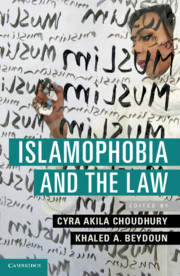Book contents
- Islamophobia and the Law
- Islamophobia and the Law
- Copyright page
- Contents
- Note on Contributors
- Acknowledgments
- Introduction
- Part I Race and Citizenship
- Part II The Politics of Islamophobia in the Courts
- Part III Islamophobia in Criminal Law and National Security Law
- Part IV Law, Society, and Islamophobia
- Index
Introduction
Published online by Cambridge University Press: 29 September 2020
- Islamophobia and the Law
- Islamophobia and the Law
- Copyright page
- Contents
- Note on Contributors
- Acknowledgments
- Introduction
- Part I Race and Citizenship
- Part II The Politics of Islamophobia in the Courts
- Part III Islamophobia in Criminal Law and National Security Law
- Part IV Law, Society, and Islamophobia
- Index
Summary
Muslims in America are no strangers to prejudice and disparate treatment based on perceived difference. Particularly during moments of crisis, whether local or global, media pundits and academics offer opinions about political Islam and modernity regardless of their actual expertise, while Muslims brace for the inevitable backlash. Much of the current Manichean thinking about Islam has a long history and can be traced back to the very first encounters between Christians and Muslims. But more recently scholars like Bernard Lewis and Samuel Huntington have argued that “Islam” is at odds with “the West” – both of these constructed as mutually exclusive and monolithic. As part of this long-standing tradition of scholarship that seeks to differentiate Islam from Judeo-Christianity and Europe, some experts continue to advance the view that Islam is incompatible with liberal values and democracy at large because of the essential differences between the two.
- Type
- Chapter
- Information
- Islamophobia and the Law , pp. 1 - 16Publisher: Cambridge University PressPrint publication year: 2020



